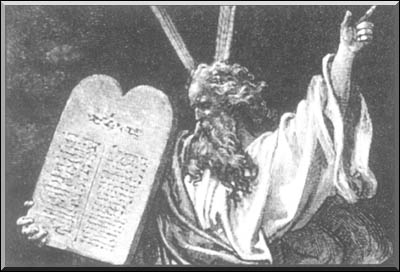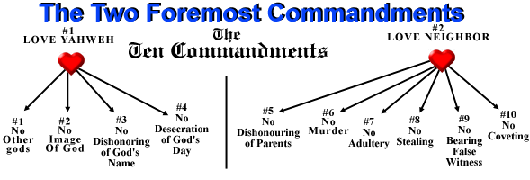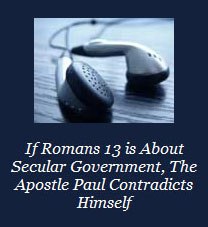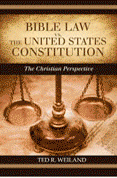|
Hear, O Israel: YHWH1 our God is one YHWH: And thou shalt love YHWH thy God with all thine heart, and with all thy soul, and with all thy might. (Deuteronomy 6:4-52)
…thou shalt love thy neighbour as thyself: I am YHWH. (Leviticus 19:18)
The law of Yahweh cannot be discarded as some archaic canon of an earlier culture's political structure without suffering horrific spiritual, social and political consequences. Instead, it is the primary dynamic through which Christians demonstrate love and devotion to their Lord and Savior, Yeshua the Christ:
If ye love me [Yeshua], keep my commandments. (John 14:15)
By this we know that we love the children of God, when we love God, and keep his commandments. For this is the love of [for] God, that we keep his commandments: and his commandments are not grievous. (1 John 5:2-3)
Rather than being replacements for the Ten Commandments, as it is sometimes taught, the two foremost commandments are simply a summary of the Ten Commandments:
Jesus said unto him, Thou shalt love YHWH thy God with all thy heart, and with all thy soul, and with all thy mind. This is the first and great commandment. And the second is like unto it, Thou shalt love thy neighbour as thyself. On these two commandments hang all the law and the prophets. (Matthew 22:37-40)
…brethren, ye have been called unto liberty; only use not liberty for an occasion to the flesh, but by love serve one another. For all the law is fulfilled in one word, even in this; Thou shalt love thy neighbour as thyself. (Galatians 5:13-14)
Owe no man any thing, but to love one another: for he that loveth another hath fulfilled the law. For this, Thou shalt not commit adultery, Thou shalt not kill, Thou shalt not steal, Thou shalt not bear false witness, Thou shalt not covet; and if there be any other commandment, it is briefly comprehended ["summed up," NASV] in this saying, namely, Thou shalt love thy neighbour as thyself. Love worketh no ill to his neighbour: therefore love is the fulfilling of the law. (Romans 13:8-10)
When the Apostle Paul instructed his Christian brothers in Galatia that they had been "called unto liberty," he was simply informing them that their adherence to Yah's laws was now voluntary rather than forced. The law is summed up, not abolished, in loving thy neighbor as thyself.

YHWH's Law Delivered to Moses
The following diagram illustrates how the whole law "hangs" upon the two foremost commandments:

(Space does not permit for each of the Ten Commandment's corresponding statutes and judgment.)
In other words, if someone loves Yahweh he will not transgress the first four commandments and their respective statutes. And, if someone loves his neighbor as himself he will not transgress the last six commandments and their respective statutes. Josiah, king of Judah, demonstrated this even while under the Mosaic Covenant:
…there [was] no king before him [Josiah], that turned to [loved] YHWH with all his heart, and with all his soul, and with all his might, according to all the law of Moses…. (2 Kings 23:25)
In order to fulfill the two foremost commandments, it is imperative to understand that "we love because [Yahweh] first loved us" - 1 John 4:19. This was demonstrated to us in the most dramatic of ways:
…God sent his only begotten Son into the world, that we might live through him. Herein is love, not that we loved God, but that he loved us, and sent his Son to be the propitiation for our sins. (1 John 4:9-10
Motivated by His love for us, Yeshua shed His blood as a sacrifice for our sins, and this love is appropriated when a person, in faith and repentance, is baptized (immersed) into Yeshua the Christ for the forgiveness of those sins - Mark 16:16; Acts 2:36-38; 22:1-16. This love is then returned to Yahweh and our fellow man as we observe Yah's laws - John 14:15; 1 John 5:2-3.
A copy of this article is available in MS Word in a zipped file and can be downloaded HERE.
Endnotes
1. Where the Tetragrammaton "YHWH" (the four Hebrew characters that represent the personal name of God) has been incorrectly rendered as "the LORD" or "GOD" in Scripture, the author has taken the liberty to correct those passages and insert "YHWH."
2. All scripture is quoted from the King James Bible.
|
|
 Printable version.
Printable version.







